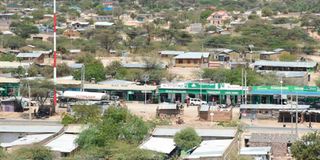Lokichar, the oil town of Turkana, hit by prolonged blackout

An aerial view of Lokichar. NLC Turkana County Coordinator James Long'ole told residents that no landowners have been identified.
Residents of Lokichar town in Turkana South sub-county have been without power for four days now, with business operations and government services paralysed.
Businesses said they were losing their customers, mainly truck drivers, travellers on the Lodwar-Kitale highway and those holding conferences and seminars.
"(When electricity was connected in 2017), most of us stopped relying on generators and solar systems to run businesses as they were too costly to maintain," said Mr Eliud Ekeru, who runs Black Gold Kileja.
Though many businesses are connected to the national grid, he said, the power is unreliable and blackouts are frequent, some lasting for up to a week.
He said the latest outage occurred on Friday night and they have been without electricity since.
Kenya Power had not said when the power will be restored, said businessman Paul Ekidor.
"Why is it that whenever there are power outages in other towns across the country residents are prepared through official communication while officials of Kenya Power in Lokichar town don't bother to publish such information to allow us to prepare ourselves?" Mr Ekidor said.
He said that only a few hotels and shops have backup solar power or generators, and he was worried that many business owners may not be able to maintain their operations.
Some residents lamented that they were in darkness about what was happening across the country because they could not watch television or use their phones.
Residents are also afraid that criminal activities may rise at night.
Idle land off highway
The Lokichar Police Station, the deputy sub-county commissioner's office, the Turkana South Community Development Fund Office, and the sub-county offices were some of those without power.
Lokichar came to life in 2012 when Tullow Oil announced it had discovered crude oil there.
Swiftly, Lokichar transformed into a vibrant urban centre.
Investors - locals and foreigners - jammed the once idle land off highway A1, dotting the town with modern malls, shops, hotels and entertainment joints.
They wanted to take advantage of the increased money in circulation thanks to hundreds of people employed directly or indirectly by the British Oil explorer and oil-drilling sub-contractors.
This improved the economic outlook of the town that for decades was hit hard by bandit attacks, poverty, poor roads and drought, moving it up to rival Lodwar, the county government headquarters.
This was followed by the building of better roads to facilitate petroleum activities, creating a conducive environment for trade.
Roads leading to oil fields were dotted with white tanks to ensure easy access to water for both livestock and locals.
Businesses such as fuel stations, transport, hotels, accommodation facilities, mobile money transfer, bank agents, entertainment joints, retail and wholesale ventures completely changed the face of Lokichar.
However, all this changed when the oil drilling was scaled down, spelling doom for both locals and the business community that had become used to the quick money and the prospects for even more, thanks to the oil miracle they were told will never stop giving.
Mr Ekeru, the hotelier, cannot believe the dip in the amount of money in circulation now.
He said his main customers were security guards, drivers and suppliers working for Tullow Oil or its contracted companies.
"My life had changed and I bought more land to expand my business. At the moment, though each of my rooms goes for Sh500, I can record only two customers a week for accommodation," he said.




